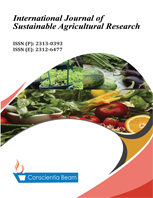Characterization and Classification of Cropland-Soils Affected by Erosion in Igbudu Ikwo, Southeastern Nigeria
DOI:
https://doi.org/10.18488/journal.70.2020.72.73.83Abstract
This research was carried out in Igbudu Ikwo, Ebonyi State in Southeastern Nigeria to investigate and classify some cropland-soils affected by erosion. Three profile pits were dug and samples were collected in their horizons. The soils physico-chemical properties analyzed indicated that all investigated soils were sandy loam (SL), bulk density was high ranging from 1.51, 1.59 and 1.42 gcm-3in pedons 1, 2 and 3 due to the preponderance of high sandiness, although within the acceptable levels (<1.85). Available P was medium (5 – 15 mgkg-1) in pedon 2 and high (>15 mgkg-1) in pedons 1 and 3. Organic matter was medium (2.0 - 4.2%) at pedons 1 and 3 and low < 2% in pedon 2 when critical limits was considered. This low organic matter content is a challenge as the soils of Igbudu Ikwo is already prone to erosion and would need high organic matter content to bind the soils particles together against disintegration by erosion processes. Sodium was very low (< 0.1 gkg-1) while K was low (<0.1 – 0.3 gkg-1 Therefore, the inputs of K fertilizer would be necessary to enhance the productivity of the soils. Calcium and Mg were very low when critical limits were considered (<2 gkg-1) and (<0.5 gkg-1) for Ca and Mg respectively. Adequate soil conservation practices and improvement of soil nutrients should be adopted for the optimum productivity of the soils of Igbudu Ikwo, Ebonyi State. The pedons were classified as Arenic Kandiudults in USDA soil taxonomy and Arenic Lixisols when correlated with WRB for soil resources.

